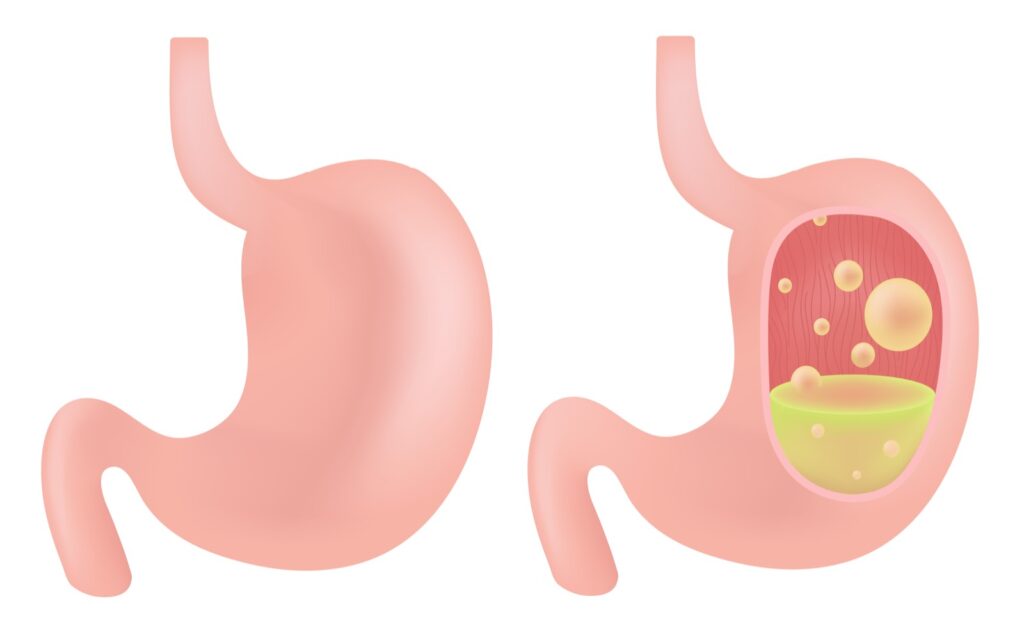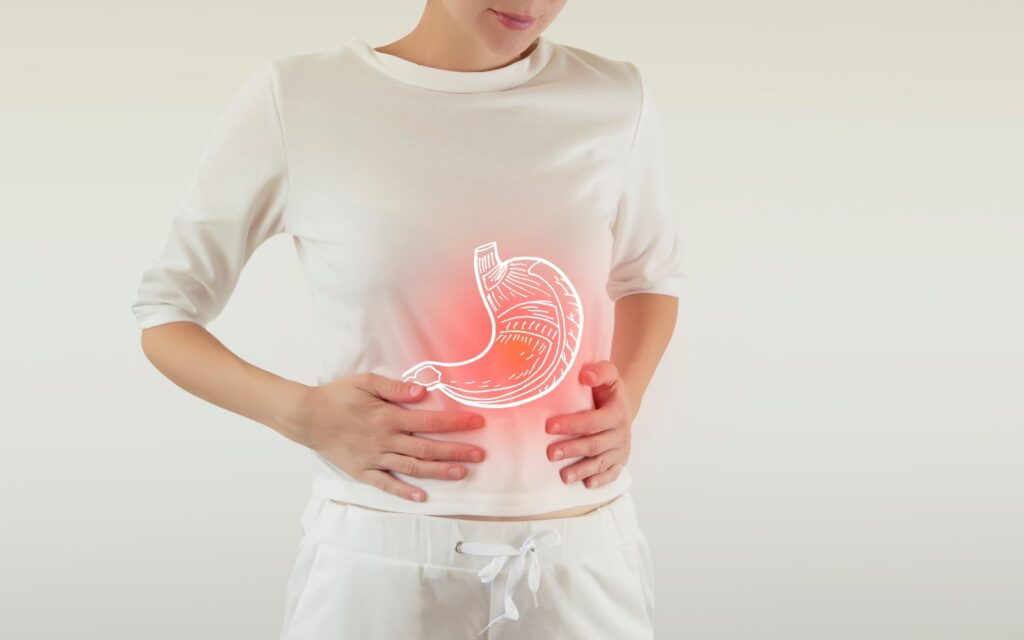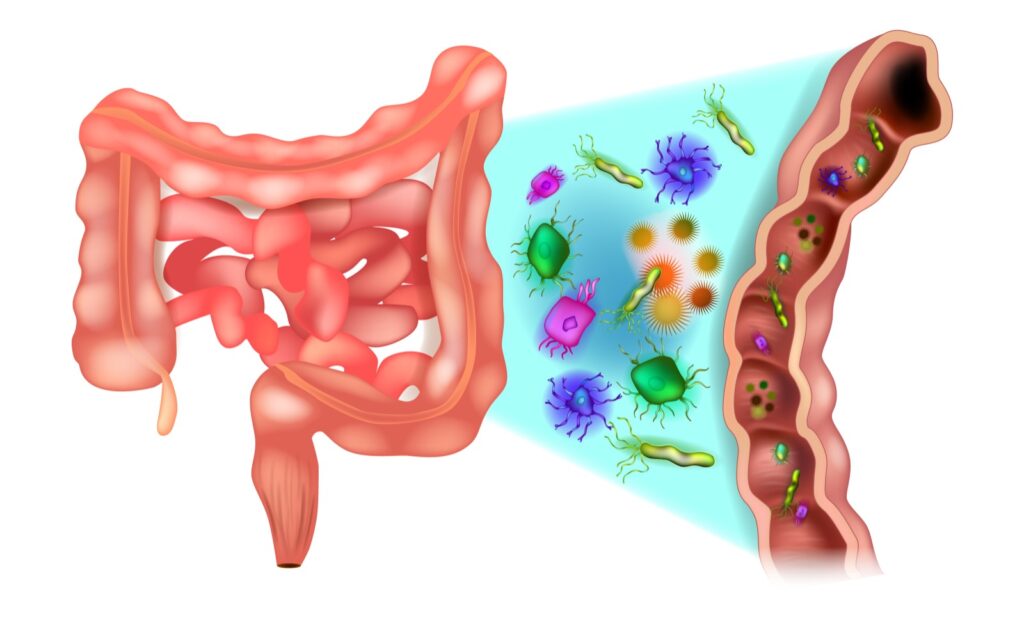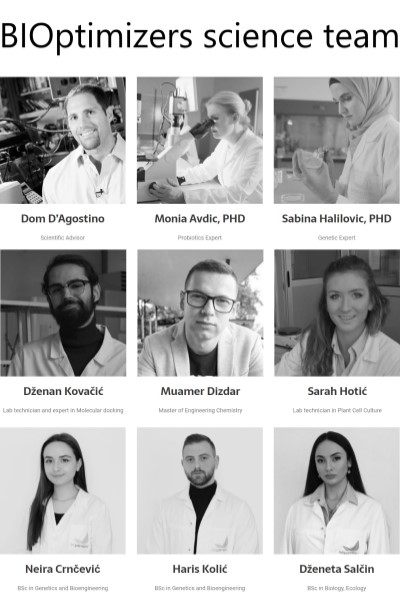
In this article, we’ll cover the causes of bloating, how digestive enzymes can help and the best digestive enzymes or support for each cause of bloating.
Do you frequently encounter discomfort from bloating and gas following meals? Although this might be a common occurrence, it’s important to note that it isn’t normal. Bloating and gas can be associated with suboptimal digestion and overall gut health, with certain foods exacerbating these issues.
Persistent bloating may indicate underlying medical conditions and it’s crucial to seek guidance from your healthcare provider for proper evaluation and diagnosis. This article is intended for individuals experiencing minor digestive discomfort attributable to diet, lifestyle, or aging, after ruling out any serious medical conditions with the assistance of a physician.

What Causes Bloating And Gas?
Gas and bloating are intricately linked and frequently stem from a shared cause. Bloating, characterized by uncomfortable abdominal expansion that can evoke sensations akin to a balloon, is typically the result of trapped gas or inflammation.
But what causes the gas or swelling? Let’s explore some of the most common culprits.
Food Intolerances
Food intolerances arise when your body lacks the necessary enzymes to digest specific foods, leaving undigested food for gut bacteria to ferment, leading to gas production. Bloating is more frequently associated with food intolerance than with a food allergy, particularly in the case of sugars and fibres. [1][2] Intolerances to substances like lactose, FODMAPs, histamine, or biogenic amines can all contribute to bloating. [1][3]
If you experience intolerances to any of these substances, incorporating enzymes that aid in their breakdown could alleviate symptoms and enable you to occasionally indulge in these foods. For instance:
• Lactase breaks down lactose
• Alpha-galactosidase breaks down many FODMAPs
• Diamine oxidase breaks down histamine in the gut
This is one of the reasons we formulated MassZymes and VegZymes to have lactase and alpha-galactosidase, along with other plant-based enzymes that can break down fermentable plant matter.
Minor Inflammatory Reactions From Foods, Such As Allergies And Sensitivities
Slight inflammatory responses to certain foods, such as allergies and sensitivities, frequently present as bloating following consumption. A notable instance is gluten sensitivity, contributing to discomfort and bloating in those with non-celiac gluten sensitivity. [4] It’s distinct from Celiac disease, though Celiac disease can also be a factor in causing bloating. [4]
Food sensitivities are different from food allergies, although both can cause bloating. Food allergies tend to present as more acute symptoms such as itchiness, swelling, and wheezing. Severe symptoms can potentially be life-threatening.
Many individuals experience inflammation from foods without being aware of it. The most effective approach to identify potential triggers is through an elimination challenge. This involves temporarily removing potential culprits from your diet until symptoms diminish, followed by reintroducing them one at a time in gradually increasing doses. It is advisable to seek guidance from a nutritionist or naturopathic doctor to navigate this process effectively.
Powermove: Consider an elimination-challenge diet.
Suboptimal Digestion And Stomach PH
Bloating frequently serves as a distinct indicator of insufficient stomach acid for the following reasons:
1. The stomach acid is your first natural defence against unhealthy microorganisms that come into the gut. Low stomach acid can allow these unhealthy microorganisms associated with bloating into your gut.
2. The acidity of the stomach content as it enters the small intestine plays a crucial role in promoting gut movement (peristalsis) and triggering the release of bile and digestive juices in the small intestine. [5][6] Inhibiting the secretion of stomach acid can also interfere with the cleansing movement of the gut that occurs between meals. [6]
Normally, a healthy small intestine maintains a minimal bacterial count due to stomach acid and regular gut cleansing movements. Yet, diminished stomach acid levels can impede healthy gut movement, potentially leading to increased growth of undesirable bacteria in the upper gut, thereby contributing to bloating.
3. The elevated acidity of the stomach (with a low pH ranging from 1 to 2) plays a crucial role in activating digestive enzymes in the stomach and triggering subsequent secretions in the small intestine. When stomach acid is below optimal levels, both stomach and small intestine digestions may be compromised. The slowed down digestion can allow gut microbes to ferment your food or leave food particles to stimulate your immune system, contributing to bloating.
Various factors, including aging and stress, can diminish stomach acid levels to suboptimal levels. During the stress response, digestion becomes less of a priority, resulting in slowed digestion and decreased stomach acid production. While a certain level of stress is normal, an ongoing inability to relax can significantly disrupt your digestive processes. [7]
Consuming meals hastily can impede proper digestion, resulting in a couple of issues. Firstly, it promotes the intake of excess air, contributing to increased gas. Additionally, insufficient time spent on chewing and breaking down food into smaller pieces can hinder effective digestion support. [8]
Powermove: HCL Breakthrough can help support healthy stomach acidity which may relieve bloating and digestive discomfort from suboptimal stomach acid and gut movement.
Suboptimal Bile Production And Flow
Insufficient production of bile is another factor contributing to gas and bloating. Bile-related problems may manifest as significant discomfort following the consumption of fats and the presence of greasy food, that result in floating stools.
You need bile for two major functions.
1. Emulsifying fats, breaking them down into smaller droplets to increase their surface area for better digestion.[9] Undigested fats can serve as fuel for bacterial fermentation in the large intestine. As the intestinal bacteria breaks these fats down, it produces gas and can accumulate, leading to bloating and gas.
2. Regulating the movement of food through the digestive tract. Insufficient bile can disrupt the normal transit of food, leading to symptoms such as[9]:
• Bloating
• Indigestion
• Constipation
Powermove: Eat healthy amounts of fats daily to naturally stimulate bile flow. Also, consider digestive bitters to stimulate healthy bile flow.
Dysbiosis Or Imbalanced Gut Bacteria

Gas and bloating may also be caused by gut dysbiosis or an imbalance in your gut bacteria. [10][11]
Dysbiosis can create an environment conducive to the growth of gas-producing bacteria or fungi, leading to the fermentation of gut contents and the production of methane, hydrogen, and carbon dioxide gases. [12][13] The generation of gas significantly contributes to your discomfort. Additionally, certain suboptimal gut microbes have the potential to exacerbate gut discomfort by interacting with gut nerves and immune cells. [14] Fixing dysbiosis involves a lot beyond taking probiotics, although probiotics are beneficial.
How Do Digestive Enzyme Supplements Help With Bloating And Gas?
If you experience signs of suboptimal digestion or discomfort after meals, it indicates that your natural digestive enzymes may be insufficient. This is where digestive enzyme supplements play a role. Usually derived from plant, animal, or microbial sources, these supplements can complement your body’s enzyme production.
Let’s take a look at what they can do.
1. Help Break Down Bloat-Inducing Substances
Plant-Based Bloat-Inducing Substances
In the natural course of eating, humans consume a variety of foods, some of which may lack specific digestive enzymes for breakdown. These substances often include fibres and unique sugars. In an ideally healthy gut, the food is transported to the large intestine, where beneficial gut bacteria assist in digesting these additional food components.
Throughout history, numerous cultures have depended on fungi such as Aspergillus oryzae, Aspergillus niger, and Saccharomyces cerevisiae in the fermentation of various foods. Consequently, we have been consuming foods that contain digestive enzymes derived from these fungi, found in products like miso, soy sauce, beers, and more.
In contemporary times, many individuals lack the habit of consuming fermented foods, leading to suboptimal gut health and reduced gut movement. This condition may permit certain plant substances to undergo fermentation in the gut, potentially resulting in bloating.
This is why our digestive enzymes include the following enzymes from food-based fungi [14]:
• Glucoamylase
• Pectinase
• Hemicellulase
• Invertase
• Beta-glucanase
• Alpha-galactosidase
• Aspergillus dipeptidyl peptidase IV (DPP IV) that can digest gluten and casein in Gluten Guardian [15]
These enzymes undergo purification to ensure they are free from fungal components, making them generally safe and effective. Nevertheless, if you have severe allergies, it is advisable to consult with your doctor before considering these supplements.
Bloat From Suboptimal Digestion
If, for any reason, you experience insufficient levels of digestive enzymes and an imbalance in gut pH, bloating may occur irrespective of your dietary choices. In such instances, proteases, amylases and lipases derived from fungal, plant or animal sources can provide assistance. [16]
An advantage of fungal enzymes is that there are various enzymes that can work in all kinds of pH. Whereas, mammalian (e.g. porcine or bovine) enzymes either need very acidic stomach pH of 1.5 – 3.5 or very alkaline small intestine pH of 6 – 7.4 to work best.[17] Our digestive enzymes include proteases that work from the most acidic to the most alkaline, and the in-between.
Clinical studies typically indicate that a more diverse enzyme blend is more effective in alleviating bloating and gut discomfort.
In a placebo-controlled study involving 40 participants who reported bloating and feelings of fullness after meals, individuals were administered a digestive enzyme supplement comprising a combination of five enzymes over a 60-day period. The group that received the enzymes exhibited a notable reduction in bloating and discomfort. [18]
In a separate study involving 62 volunteers experiencing common digestive symptoms such as gas and bloating, participants were given a comprehensive blend of digestive enzymes. They consumed one enzyme per meal over a span of five days. They experienced an improvement in all digestive areas, including [19]:
• Inability to finish a meal
• Heavy stomach
• Abdominal bloating
• Abdominal pain
• Heartburn
• Nausea
• Excessive burping
These studies demonstrate that combining multiple enzymes in one supplement is highly effective against uncomfortable bloating. MassZymes contains over ten different enzymes to ensure that the right enzymes are available for you no matter what your meal contains, including those linked to relief from FODMAPs, dairy and more.
Digestive enzymes, especially those incorporating betaine HCl, play a key role in sustaining a healthy digestive system. Betaine HCl promotes optimal stomach acidity and duodenal pH, essential for effective digestion [20]. These factors also serve as natural defences against the proliferation of unhealthy bacteria and undesirable fermentation in the upper gut.
When these pH levels are at their optimal range, it facilitates the healthy flow of bile and promotes effective gut movement. This reduces the risk of food stagnation in your digestive system, which can otherwise lead to increased bloating and gas due to fermentation.
2. May Help With Dysbiosis
Digestive enzymes can additionally contribute to improved gut health by addressing the dysbiosis-related factors that lead to gas and bloating.
Other studies regarding the effectiveness of enzymes are primarily done with pigs and applied to humans. This is because they are anatomically and functionally similar to us.[21]
A meta-analysis concentrated on animal studies investigated the impact of digestive enzymes on the gastrointestinal health of pigs. The supplementation of pigs’ food with digestive enzymes led to enhanced gut health, marked by elevated levels of Lactobacillus and a reduction in harmful bacteria. Overall, enzymes seemed to reduce suboptimal bacteria and support a healthy gut microbiome, which promoted gut health.[22]
What Are The Best Digestive Enzymes For Bloating And Gas?
Let’s take a look at various digestive enzyme options to address bloating and gas.

Full-Spectrum Digestive Enzymes
Full-spectrum digestive enzymes means:
1. It contains all the enzymes that break down food and bloat-inducing components
2. It works across all gut pH, even when your stomach acidity is suboptimal
These formulations can minimize the guesswork and cover your bases. Also, we make sure our digestive enzymes formulas contain very high concentrations of digestive enzymes to:
• Break down bloat-inducing food components such as lactose, FODMAPs, sugar and fibres
• Ensure healthy digestion of proteins, carbohydrates, and fats
• Break down proteins to help prevent bad bacteria from having fuel to feed off of and ferment in your gut
MassZymes is our most popular full-spectrum digestive enzyme blend, especially if you’re eating a large meal or on a high-protein diet. Many of our customers found other digestive enzymes ineffective before trying and loving MassZymes.
VegZymes is our full-spectrum digestive enzyme formulated specifically for plant-based diets. This is because plant-based diets tend to have less proteins and fats, but more carbohydrates and fermentable plant matter.
Broad-Spectrum Digestive Enzymes
Broad spectrum digestive enzymes may contain many, but not all enzymes that digest food matters. They may also not work across all gut pH levels, especially with suboptimal stomach and small intestine pH.
Most animal-sourced enzymes are broad-spectrum and not full-spectrum, just because they work best with optimal gut pH and not in-between.
Our broad-spectrum digestive enzymes include:
• kApex for high-fat meals. It includes dandelion root to support bile flow, along with high concentrations of proteases and lipases. It’s best for those on ketogenic or low-carb diets.
• Gluten Guardian for high-carb meals, and meals containing gluten or casein.
Lactose Support
If the consumption of dairy leads to gas and bloating, beta-galactosidase or lactase can be beneficial for managing lactose intolerance. A placebo-controlled study involving 30 adults with a deficiency in lactase enzyme investigated the impact of beta-galactosidase on symptoms of lactose intolerance.
All participants reported a decrease in bloating when enzymes were introduced. The impact was more pronounced when the enzymes were incorporated 10 hours before consumption rather than immediately before drinking milk [R23]. Hence, consuming milk with pre-added enzymes is likely the most effective approach, but some relief can also be obtained by taking beta-galactosidase just before consuming dairy.
BIOptomizers’ MassZymes are full-spectrum digestive enzymes that have got you covered, with lactase included to help tackle lactose intolerance.
Gluten Support
For individuals experiencing bloating due to gluten, the enzyme Aspergillus dipeptidyl peptidase IV (DPP IV) may offer relief or aid in a quicker recovery.
The efficacy of DPP IV in degrading gluten was evaluated in a placebo-controlled study involving 12 healthy adults. Participants were given meals containing 5.2 grams of gluten, equivalent to approximately two slices of wheat bread. [24]
Regardless of the meal’s caloric density, the enzyme efficiently broke down nearly all the gluten in the stomach within 1 hour. In contrast, gluten remained in the stomach for 3 hours with the placebo.[24]
Stomach PH Support: Betaine HCl
Taking betaine HCl with your meals may help alleviate gas and bloating issues caused by low stomach acid.
In a comprehensive review, investigators examined the utilization of betaine HCl with meals for addressing low stomach acid. Their findings suggested that betaine HCl facilitates a rapid re-acidification of the stomach to optimal pH levels. The researchers also provided recommendations on the optimal administration of betaine HCl. [20]
• Begin by taking between 350-750 mg of betaine HCl with a protein-containing meal and slowly work up to tolerance.
• Take smaller amounts with smaller meals.
• Signs of intolerance generally indicate that your stomach acid levels are returning to normal.
• Do not empty betaine HCl into drinks to avoid tissue and teeth irritation.
• It should not be used by those suffering from peptic ulcers.
Once again, BIOptimizers has got you covered with a great betaine HCl supplement with an extra digestive bonus. HCL Breakthrough contains 100% plant-based betaine HCl along with digestive enzymes that work best in acidic conditions. That means you can restore optimal stomach digestion to support overall digestion.
How Long Does It Take For Digestive Enzymes To Work For Bloating And Gas?
So, you’ve decided to start taking digestive enzymes, but how quickly will you experience relief? Well, that depends on the cause of your bloating as well as a few other factors.
When you take digestive enzymes just before or with your meals, they work immediately (within 15 minutes to a few hours) to prevent any gas or bloating that may occur. They actively assist in digestion as your food moves through your system.
To ensure optimal results, taking digestive enzymes with each meal that typically triggers your gas or bloating is important. Remember, the effects of the enzymes don’t carry over to your next meal, so we recommend being consistent.
If the bloating comes from other causes such as an overgrowth or other types of fermentation in your gut, digestive enzymes may be less effective. In this case, consider seeing a functional or naturopathic doctor to assess and treat the overgrowth.
By combining the regular use of digestive enzymes with avoiding trigger foods and good eating hygiene, you can expect greater relief from gas and bloating symptoms. Give yourself the best chance for comfort by supporting your digestion with enzyme supplementation and mindful food choices.
Takeaway
Bloating and gas can be uncomfortable, impacting your quality of life. The efficacy of digestive enzymes may differ from person to person. Nonetheless, incorporating suitable enzyme supplements and making thoughtful food choices can offer relief, promote optimal digestion, and ultimately contribute to an improvement in your overall well-being and comfort.
• Speaking to your doctor to rule out any serious conditions
• Determining what foods may be bothering you with an elimination diet or with your naturopathic doctor or nutritionist
• Taking full-spectrum enzymes like MassZymes to break down a variety of foods
• Supporting healthy stomach pH with HCL Breakthrough
• Trying out Gluten Guardian to support gluten and dairy digestion if you consume these foods
- Gargano D, Appanna R, Santonicola A, et al. Food allergy and intolerance: A narrative review on nutritional concerns. Nutrients. 2021;13(5):1638. doi:10.3390/nu13051638
- Seo AY, Kim N, Oh DH. Abdominal bloating: pathophysiology and treatment. J Neurogastroenterol Motil. 2013;19(4):433-453. doi:10.5056/jnm.2013.19.4.433
- Tuck CJ, Biesiekierski JR, Schmid-Grendelmeier P, Pohl D. Food intolerances. Nutrients. 2019;11(7):1684. doi:10.3390/nu11071684
- Roszkowska A, Pawlicka M, Mroczek A, Bałabuszek K, Nieradko-Iwanicka B. Non-celiac gluten sensitivity: A review. Medicina (Kaunas). 2019;55(6):222. doi:10.3390/medicina55060222
- Greenwood B, Davison JS. The relationship between gastrointestinal motility and secretion. Am J Physiol Gastrointest Liver Physiol. 1987;252(1):G1-G7. doi:10.1152/ajpgi.1987.252.1.g1
- Verkijk M, Gielkens HAJ, Lamers CBHW, Masclee AAM. Effect of gastrin on antroduodenal motility: role of intraluminal acidity. Am J Physiol Gastrointest Liver Physiol. 1998;275(5):G1209-G1216. doi:10.1152/ajpgi.1998.275.5.G1209
- Huerta-Franco MR, Vargas-Luna M, Tienda P, Delgadillo-Holtfort I, Balleza-Ordaz M, Flores-Hernandez C. Effects of occupational stress on the gastrointestinal tract. World J Gastrointest Pathophysiol. 2013;4(4):108-118. doi:10.4291/wjgp.v4.i4.108
- Keller J, Layer P. The pathophysiology of malabsorption. Viszeralmedizin. 2014;30(3):150-154. doi:10.1159/000364794
- Hundt M, Basit H, John S. Physiology, Bile Secretion. StatPearls Publishing; 2022.
- DeGruttola AK, Low D, Mizoguchi A, Mizoguchi E. Current understanding of dysbiosis in disease in human and animal models. Inflamm Bowel Dis. 2016;22(5):1137-1150. doi:10.1097/MIB.0000000000000750
- Pérez JC. The interplay between gut bacteria and the yeast Candida albicans. Gut Microbes. 2021;13(1):1979877. doi:10.1080/19490976.2021.1979877
- Banaszak M, Górna I, Woźniak D, Przysławski J, Drzymała-Czyż S. Association between gut dysbiosis and the occurrence of SIBO, LIBO, SIFO and IMO. Microorganisms. 2023;11(3):573. doi:10.3390/microorganisms11030573
- Manichanh C, Eck A, Varela E, et al. Anal gas evacuation and colonic microbiota in patients with flatulence: effect of diet. Gut. 2014;63(3):401-408. doi:10.1136/gutjnl-2012-303013
- Wei L, Singh R, Ro S, Ghoshal UC. Gut microbiota dysbiosis in functional gastrointestinal disorders: Underpinning the symptoms and pathophysiology. JGH Open. 2021;5(9):976-987. doi:10.1002/jgh3.12528
- Ehren J, Morón B, Martin E, Bethune MT, Gray GM, Khosla C. A food-grade enzyme preparation with modest gluten detoxification properties. PLoS One. 2009;4(7):e6313. doi:10.1371/journal.pone.0006313
- Garvey SM, Guice JL, Hollins MD, Best CH, Tinker KM. Fungal digestive enzymes promote macronutrient hydrolysis in the INFOGEST static in vitro simulation of digestion. Food Chem. 2022;386(132777):132777. doi:10.1016/j.foodchem.2022.132777
- Fallingborg J. Intraluminal pH of the human gastrointestinal tract. Dan Med Bull. 1999;46(3):183-196. Accessed June 14, 2023. https://pubmed.ncbi.nlm.nih.gov/10421978/
- Majeed M, Majeed S, Nagabhushanam K, et al. Evaluation of the safety and efficacy of a multienzyme complex in patients with functional dyspepsia: A randomized, double-blind, placebo-controlled study. J Med Food. 2018;21(11):1120-1128. doi:10.1089/jmf.2017.4172
- Quinten T, Philippart JM, De Beer T, Vervarcke S, Van Den Driessche M. Can the supplementation of a digestive enzyme complex offer a solution for common digestive problems? Arch Public Health. 2014;72(S1):P7. doi:10.1186/2049-3258-72-s1-p7
- Guilliams TG, Drake LE. Meal-time supplementation with betaine HCl for functional hypochlorhydria: What is the evidence? Integr Med (Encinitas). 2020;19(1):32-36.
- Walters EM, Prather RS. Advancing swine models for human health and diseases. Mo Med. 2013;110(3):212-215.
- Ramani S, Recharla N, Hwang O, Jeong J, Park S. Meta-analysis identifies the effect of dietary multi-enzyme supplementation on gut health of pigs. Sci Rep. 2021;11(1):7299. doi:10.1038/s41598-021-86648-7
- Montalto M, Nucera G, Santoro L, et al. Effect of exogenous beta-galactosidase in patients with lactose malabsorption and intolerance: a crossover double-blind placebo-controlled study. Eur J Clin Nutr. 2005;59(4):489-493. doi:10.1038/sj.ejcn.1602098
- Salden BN, Monserrat V, Troost FJ, et al. Randomised clinical study: Aspergillus niger-derived enzyme digests gluten in the stomach of healthy volunteers. Aliment Pharmacol Ther. 2015;42(3):273-285. doi:10.1111/apt.13266


